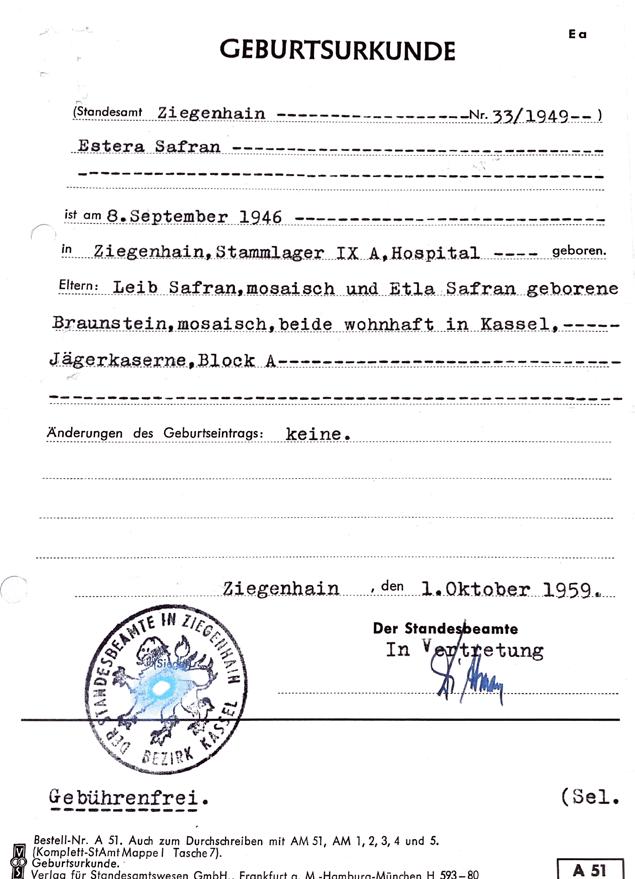
4 minute read
Excerpt from Everything Is Illuminated
Excerpt: Everything Is Illuminated
Excerpt from Everything Is Illuminated: A Novel by Jonathan Safran Foer. Copyright © 2002 by Jonathan Safran Foer. Used by permission of Houghton Mifflin Harcourt. All rights reserved.
As Esther explains (p. 112-115), when her middle son, Jonathan, needed a project for his senior thesis, she suggested traveling to Ukraine to find the family that hid his grandfather. That journey—and his imaginings of what Trochenbrod would have looked like after finding no remaining trace of it—in a fictionalized form became the novel Everything Is Illuminated. Below is a brief excerpt from Everything Is Illuminated. If you haven’t read the novel, or haven’t read it recently, this conversation takes place between the main character, Jonathan Safran Foer, and his Ukrainian guide, who narrates part of the story (p. 59-60). As you read, pay attention to the the “true to life” details in the scene that you recognize from I Want You to Know We’re Still Here. It was pending this five-hour car drive from the Lvov train station to Lutsk that the hero explained to me why he came to Ukraine. He excavated several items from his side bag. First he exhibited me a photograph. It was yellow and folded and had many pieces of fixative affixing it together. “See this?” he said. “This here is my grandfather Safran.” He pointed to a young man who I will say appeared very much like the hero, and could have been the hero. “This was taken during the war.” “from Who?” “No, not taken like that. The photograph was made.” “I understand.” “These people he is with are the family that saved him from the Nazis.” “What?” “They…saved…him…from… the…Na…zis.” “In Trachimbrod?” “No, somewhere outside of Trachimbrod. He escaped the Nazi raid on Trachimbrod. Everyone else was killed. He lost a wife and a baby.” “He lost?” “They were killed by the Nazis.” “But if it was not Trachimbrod, why do we go to Trachimbrod? And how will we find this family?” He explained to me that we were not looking for the family, but for this girl. She would be the only one still alive.
He moved his finger along the face of the girl in the photograph as he mentioned her. She was standing down and right to his grandfather in the picture. A man who I am certain was her father was next to her, and a woman who I am certain was her mother was behind her. Her parents appeared very Russian, but she did not. She appeared American. She was a youthful girl, perhaps fifteen. But it is possible that she had more age. She could have been so old as the hero and me, as could have been the hero’s grandfather. I looked at the girl for many minutes. She was so so beautiful. Her hair was brown, and rested only on her shoulders. Her eyes appeared sad, and full of intelligence.
“I want to see Trachimbrod,” the hero said. “To see what it’s like, how my grandfather grew up,
where I would be now if it weren’t for the war.” “You would be Ukrainian.” “That’s right.” “Like me.” “I guess.” “Only not like me because you would be a farmer in an unimpressive town, and I live in Odessa, which is very much like Miami.” “And I want to see what it’s like now. I don’t think there are any Jews left, but maybe there are. And the shtetls weren’t only Jews, so there should be others to talk to.” “The whats?” “Shtetls. A shtetl is like a village.” “Why don’t you merely dub it a village?” “It’s a Jewish word.” “A Jewish word?” “Yiddish. Like schmuck.” “What
does it mean schmuck?” “Someone who does something that you don’t agree with is a schmuck.” “Teach me another.” “Putz.” “What does that mean?” “It’s like schmuck.” “Teach me another.” “Schmendrik.” “What does that mean? “It’s also like schmuck.” “Do you know any words that are not like schmuck?” He pondered for a moment. “Shalom,” he said, “which is actually three words, but that’s Hebrew, not Yiddish. Everything I can think of is basically schmuck. The Eskimos have four hundred words for snow, and the Jews have four hundred for schmuck.” I wondered, What is an Eskimo?
“So, we will sightsee the shtetl?” I asked the hero. “I figured it would be a good place to begin our search.” “Search?” “For Augustine.” “Who is Augustine?” “The girl in the photograph. She’s the only one who would still be alive.” “Ah. We will search for Augustine, who you think saved your grandfather from the Nazis.” “Yes.” It was very silent for a moment. “I would like to find her,” I said. I perceived that this appeased the hero, but I did not say it to appease him. I said it because it was faithful. “And then, I said, “if we find her?” The hero was a pensive person. “I don’t know what then. I suppose I’d thank her.” “For saving your grandfather.” “Yes.” “That will be very queer, yes?” “What?” “When we find her.” “If we find her.” “We will find her.” “Probably not,” he said. “Then why do we search?” I queried, but before he could answer, I interrupted myself with another query. “And how do you know that her name is Augustine?” “I guess I don’t, really. On the back, see, here, are written a few words, in my grandfather’s writing, I think. Maybe not. It’s in Yiddish. It says: ‘This is me with Augustine, February 21, 1943.’” “It’s very difficult to read.” “Yes.”



